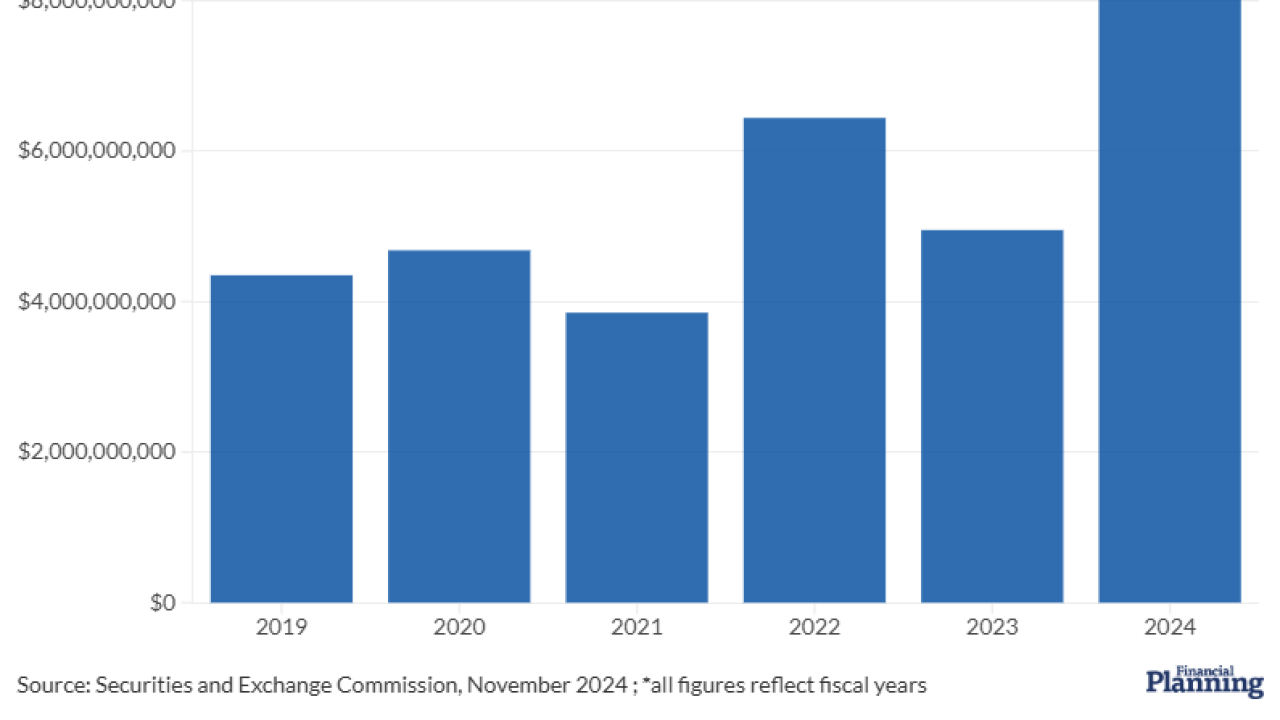The hearty predictions surrounding outsourcing in the asset management industry three years ago that mostly fizzled during the bear market, may finally be on their way to fruition, according to a recently released white paper.
"A Novel Look at Outsourcing in the Asset Management Industry: The Customer's Perspective," just issued by TowerGroup, predicts that the frequency and scope of outsourcing contracts will increase over the next year and a half and forecasts assets under administration to jump 12% a year through 2007.
"I don't think we have realized the predicted wave of outsourcing we expected in 2001," admitted Tim Lind, a senior analyst with TowerGroup and author of the report. The downward bear market and the struggling economy didn't help matters, Lind noted. "Outsourcing is very strategic," he said. "Outsourcing is still a nascent business model and the full economics have not yet unveiled themselves, especially over the long term."
According to the report, 44% of firms are predisposed to outsourcing. Within that group, 13% indicate their intent to outsource all of the company's non-core functions, while the remaining 31% are taking a more guarded approach, saying they would prefer to delegate "commoditized processes" to providers. However, more than one-third, or 37% of firms, intend to keep operations in-house, while 21% of the firms are either reviewing their outsourcing options or are unsure of their firm's position on outsourcing.
One of the biggest hurdles to outsourcing has been the buy-side's reluctance to enter into long-term contracts for a number of functions. "The thought of a seven-year contract can be nerve-racking because there is no way to reverse it," Lind said. Customers want to get to know a provider before entering into a marriage of sorts, and they are reluctant to outsource functions they do well just because the function in question is part of a whole package they are considering purchasing from a provider. So, providers have altered their approach, settling for getting a foot in the door with the possibility of more business later, he said.
Custodians have altered their approach by allowing "more modular, selective access to outsourcing services." Risk-averse clients can pick and choose from a selection of unbundled services and choose a combination of services within their comfort zone, while planning to phase in more services as they grow more accustomed to the idea and processes of outsourcing.
Firms providing outsourcing struggled through 2002 and much of 2003, until the providers started to deliver tailored services. The atmosphere started to change in the third and fourth quarters of last year, as outsourcing started to come out of the doldrums. The trailing 12 months have been the best for outsourcing in terms of new contracts, according to Lind. "There is a lot of optimism," he said.
Business product outsourcing sales contracts began to fill the pipelines. Firms including Foreign & Colonial, Standard Life, Isis Asset Management, Investec Asset Management, AXA Asset Management and RCM Capital Management have all recently agreed to outsource operations to custodians.
Aside from the business aspects of outsourcing, Lind said the decision often is politically driven. "At the end of the day, we are dealing with humans and politics," Lind said. "Technology is not the issue, or human ability. You're dealing with a lot of political issues. Outsourcing inevitably means change. The political issues around outsourcing are a great factor in whether a firm will outsource or not."
However, Lind said that traditional management fees may come under pressure in the years going forward, as expectations for the markets are not overly optimistic. "Firms cannot control the markets, but they can control their own infrastructure efficiency," Lind said. "The whole macroeconomics of the asset management industry will become more challenging."
Five Areas
Outsourced functions generally fall into one of five categories: accounting and data management, business support, connectivity, post-trade services and execution services. And the reasons for outsourcing can range widely. Capability, or lack thereof, is one key reason firms may outsource. However, the decision to outsource is often motivated by the need to improve capabilities. Firms may also want to outsource functions as an alternative to developing a costly, in-house system infrastructure for post-trade functions.
Lind said that connectivity services have been the most successful, thus far, in propelling customers into purchasing more operational services. Hosting connectivity functions, such as messaging infrastructure, a custodian can link its buy-side customers and third-party custodians that hold the assets. This leaves the provider in a prime position to assume additional outsourced business such as trade support, exception resolution and reconciliation.
The market for outsourcing services is approximately $2.6 billion, including fund administration services beyond core custody, according to TowerGroup estimates. The market for outsourcing should grow in the low double-digits, the firm said. The competitive environment in the asset management industry, combined with an increase in allocations in alternative vehicles and growth in global retirement schemes, will lead to sustained growth over the next three years in fund administration services, Lind indicated in his report.
Lind also said that the recent scandals and regulatory probes in the mutual fund industry may lead to more outsourcing since some firms may outsource certain functions, such as capturing and recording e-mails, so that they can focus on meeting certain regulatory mandates.
Outsourcing can provide an "extra set of eyes that are not necessarily beholden to the front office. A third party has no incentive to allow a hedge fund to make questionable trades. It may not be a bad idea for a third party to act almost like an audit. The heightened regulatory awareness will result in a benefit to the outsourcing market," Lind said.





